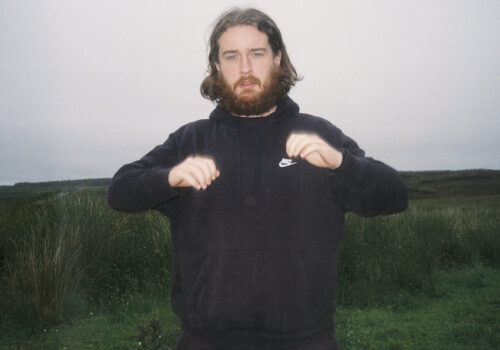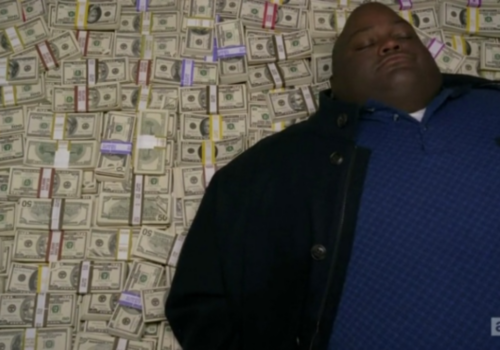Kojaque’s ‘Town’s Dead’ is a bittersweet symbol of Dublin’s creative brain drain
Words: Dylan Murphy
Town’s Dead lands in the midst of a golden era for Ireland’s music community, but with Kojaque and other creative trailblazers leaving for greener pastures it’s become a timestamp of the turning point for a generation whose hometown has little to offer them.
“‘Town’s Dead‘ comes from the potential that I see in Dublin and in the people, I’m surrounded by day in and day out. There’s nothing but talent and ambition among young people, I’m constantly reminded of that through the art and music that I see being made but I think so often the city grinds you down, it takes your hope and your ambition”.
That’s Dublin rapper Kojaque summing up both the core message of his debut album, Town’s Dead and the feeling of hopelessness in the capital’s creative community.
Landing like a bittersweet punch to the gut, Kojaque’s parting gift to Ireland comes at a time where Ireland’s DIY community’s creative powers are becoming fully realised.
Acts across the country innovated with live streams and adapted to a world without mosh pits with listeners showing support through Bandcamp Fridays. On one end of the scale, Dublin’s Gemma Dunleavy turned tragedy into triumph on Up De Flats and shelled a remote Boiler Room set. While Limerick’s Denise Chaila established herself as a globally recognised one to watch with her performance in the National Gallery of Ireland and subsequent Choice Prize-winning mixtape.
Elsewhere, acts like Cork native Gaptoof created their own online communities. With the Soft Boy Records producer hosting beat battles online from his bedroom, binding together a community of artists that were left behind and at once rewriting the rules on how acts can sustain themselves and grow their audience from home.
And in those victories, it’s easy to understand the glimmer of hope the Dublin rapper has for his own city. The considered rollout for the album started in the heat of last summer’s bubbling political activism whilst technological innovations ensured we could shrink the world to the size of our living room. For a brief moment, it did feel like there was an opportunity to rewrite the wrongs of capitalism’s crippling grip on Dublin.
Instead, we find ourselves in the position of having a city full of young creatives that would rather risk drowning alone in an unfamiliar place than make the choice between living with their ma or spending 80 per cent of their wages on a box room.
The headlines of “young people are leaving” have missed the boat, they’ve already left.
For all the hope Kojaque holds for his city and all the innovation Gaptoof underwent from his bedroom, it wasn’t enough to halt the pair from relocating to London. Whilst Kojaque and other creative trailblazers from all over the globe head to the city to push their career to the next level, it’s usually a calculated risk for artists on the verge of establishing themselves. Whereas for a new generation of people from Ireland it’s a way to afford moving out.
It goes without saying that Irish people immigrating is nothing new. But with young people about to enter the second major recession in their lifetime and with the passport stamps of their older siblings fresh in their mind, there’s an ambience of resignation in the air – if you want a sense of agency, you have to go.
That’s not to say it’s been an easy decision, historically speaking. Leaving the place you grew up in is tough and often departing felt like a concession; the kind of decision you made for your own greater good at the cost of missing your hometown’s bruises whilst forgiving its imperfections. But with a housing crisis of unprecedented proportions homelessness is on the rise, the chances of ever owning a home are becoming a pipedream and with the political elite’s attitudes towards young people brought into focus in the literal caging of social spaces this summer, strained relationships to Dublin have succumbed to collective ambivalence.
Perhaps that’s why the timing of the album’s release could not be more bittersweet. A poster boy for the rise of hip hop in Ireland, Kojaque’s arrival on the scene rode the coat tail of Rejjie Snow’s global success. It helped the wider public see the parallels between Ireland’s poetic history and America’s most popular modern export rather than accepting the ingrained ignorance of “Irish people can’t rap”.
On ‘Casio‘ he captures that idea where he overcame stigma to become a celebrated artist on his own terms. Part of this journey is indebted to contribute to and help to build an enthusiastic community through live shows.
The hip hop scene, while imperfect, is a symbol of the resilient spirit of Ireland’s creatives and the conceptual home for many of this era’s great protest anthems. While there’s certainly room to weed out misogyny and scope for improvement in the live arena, god knows how we’ll get there with community strongholds like Jigsaw and experimental training grounds like the Bernard Shaw closing their doors.
Adopting the “if you don’t laugh you’d cry” attitude in its skits that so many people endure just to keep their heads above water, Town’s Dead finds its conceptual home in the story of a few friends trying to find somewhere to have a party on New Year’s eve when none of them have a gaff of their own.
With a lot more work to do and the incentives to stay wearing thin, the record which lands as a call to arms feels symbolic of a relationship at breaking point.
While the town might not be dead yet, it’s certainly on its last legs and people aren’t sticking around to resuscitate it.





